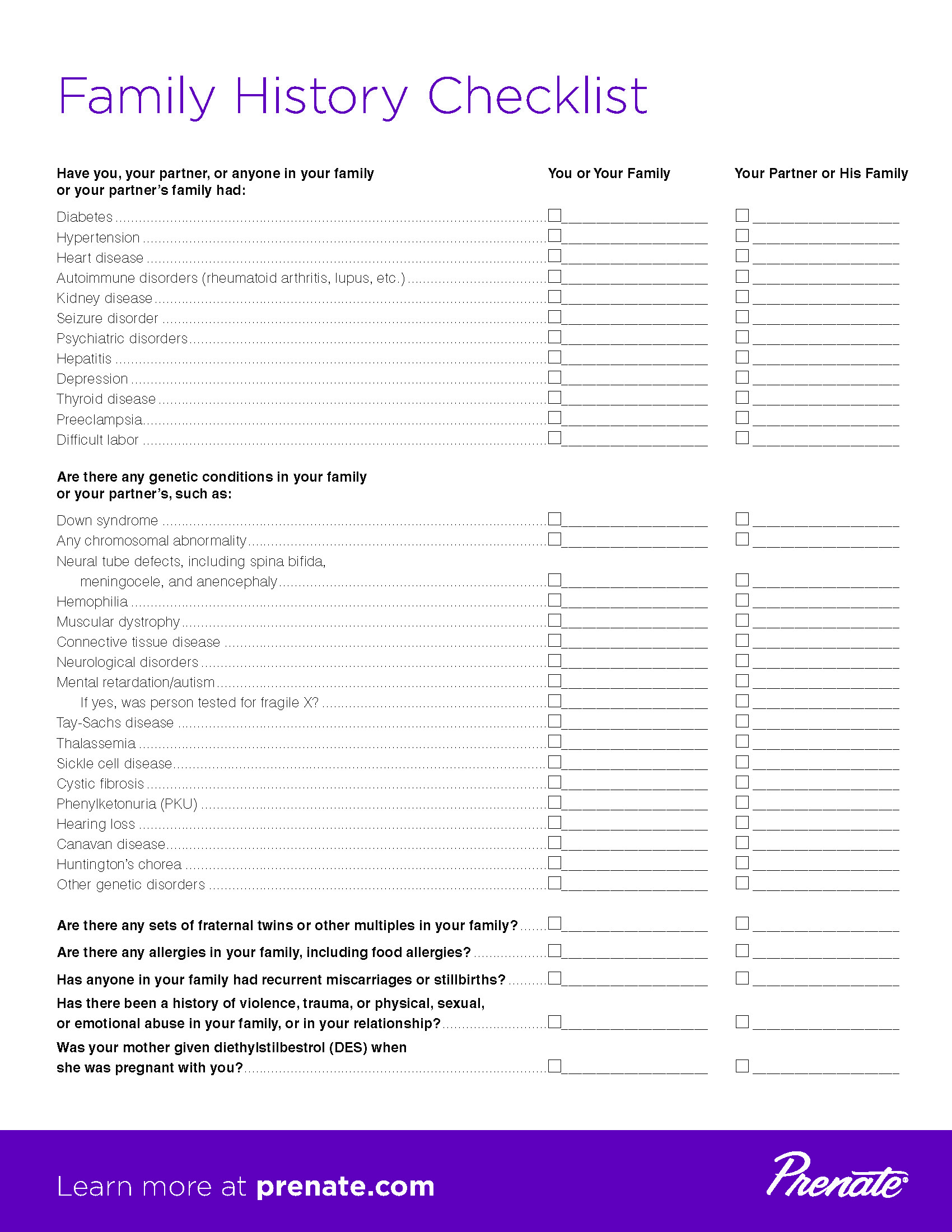Spring Into Nutrition
March 23, 2016
Spring is officially here, and now is the time to regroup, reprioritize, and reinvent your prenatal nutrition. Lighten your winter load and welcome spring by renewing your nutritional goals. The best place to start is by assessing your health.
Take Inventory of your Genetics
It’s not just your medical history that affects your health and pregnancy; your genes play a big role too. Early in your pregnancy, your doctor is likely to ask about your medical history, as well as the medical histories of your baby’s father, your parents, and other members of your family. Accurate information is important, so take the time to ask your parents and other family members about their health histories. We know it’s not easy recalling your family medical history on the spot (or on the exam table). We’ve created a checklist to take out some of the guesswork. You can download and print it here or click the graphic to the right.
Review this checklist with your partner, your parents or other family members for details you’re not privy to. Write the relationship of the family member(s) who have or previously experienced the condition noted. Bring the checklist to your first visit with your prenatal healthcare provider. They will use it to help evaluate if any potential pregnancy risks may exist.
Be Realistic about Stress Levels
Stress is a part of daily life. During pregnancy some stress is normal. However, prolonged or high levels of stress can have negative effects on both mom and baby. Unfortunately, it can be difficult to tell if a pregnant woman is experiencing too much stress, as some symptoms of stress are also common concerns in pregnancy (fatigue and irregular sleeping habits are just two examples). Because of this, it is very important that women listen to their bodies, especially before and during pregnancy.
We recommend that you keep a journal or add a note in your phone each time you feel stressed or experience symptoms of high stress. Such symptoms include trouble sleeping, headaches, loss of appetite, or overeating. If possible, identify what triggered the symptom or feeling. Did you stay awake thinking about work-related issues? Did you start to worry about the health of the baby and immediately hit the fridge for a snack? After a week, review the list of times you felt stressed to gauge when your stress levels peaked and what may have contributed to your stress.
Identifying the cause of stress is the first step. You also need to take steps to reduce stress during pregnancy. Talk to and ask for help from your partner, friends, or anyone you trust. Identify a support network of resources you can turn to for assistance. Cut back on activities that are not essential. Talk to your healthcare provider about how to handle any discomfort that may be a cause of stress.
Start Tracking Diet & Exercise
If you have a smartphone, you can take advantage of a number of free and paid apps that help you track the foods you eat. Many of these apps come preloaded with nutritional information for prepared foods and restaurant meals. In just a few days, such apps can give you a snapshot of your nutritional habits, including your daily intake of nutrients that are critical before, during, and after pregnancy.
Most of these apps also let you track calories burned during exercise, including cardio and aerobic activities. While it’s not ideal to try to lose weight during pregnancy, these tools can give you a picture of your net calorie intake and your frequency and intensity of exercise.
Once you have data to review, you can identify nutritional gaps that exist in your diet. Be sure to evaluate the amount of protein, carbohydrates, and fats you’re eating as well as your intake of vitamins and minerals. Your health care provider can provide detailed information about the ratio you should be targeting as well as caloric intake (for example, 40% protein, 40% carbohydrates and 20% fats in 1,200 calories consumed daily). With your doctor, determine how your diet can be better balanced and identify opportunities for adding regular exercise to your weekly routine.
Pregnancy Vitamins for Nutritional Support
The Prenate® Vitamin Family offers pregnancy vitamins to help boost energy, fill gaps in nutrition, and provide nutritional support for mothers and their babies during every stage of pregnancy and after delivery. Recognizing the different needs of women during pregnancy, Prenate® offers 8 prenatal vitamins for mothers to choose from to meet their nutritional and pregnancy goals. Ask your doctor if the Prenate® Vitamin Family is right for you. Here’s to a healthy, happy, and revitalizing spring!
You Are About To Leave This Website
By clicking continue, this link will take you to a website to which Alora Pharmaceuticals Policies & Terms of Use do not apply. Alora and its subsidiaries do not control the content or accuracy of third-party websites and assume no responsibility for their use.















